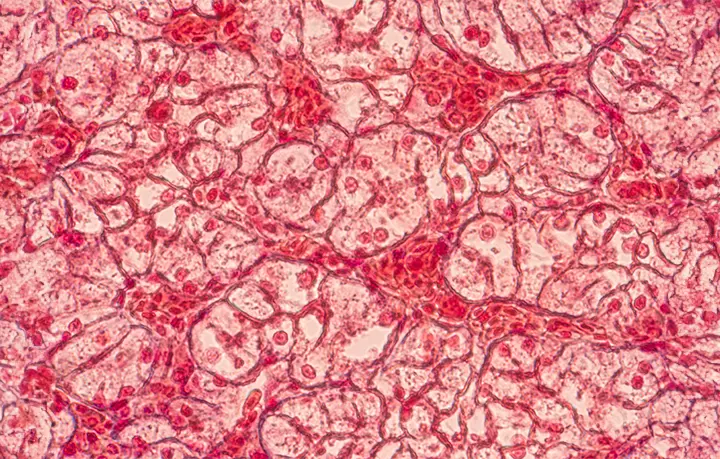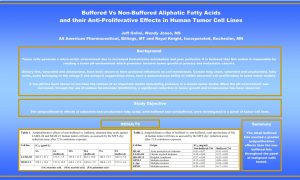Buffered Vs Non-Buffered Aliphatic Fatty Acids and their Anti-Proliferative Effects in Human Tumor Cell Lines
Jeff Golini, Wendy Jones, MS
All American Pharmaceutical, Billings, MT and Royal Knight, Incorporated, Rochester, MN
Background
Tumor cells generate a micro-acidic environment due to increased fermentative metabolism and poor perfusion. It is believed that this action is responsible for creating a lower pH environment which promotes invasive tumor growth in primary and metastatic cancers.
Dietary fats, saturated and unsaturated, have been shown to have profound influences on cell membranes. Certain long chain, saturated and unsaturated, fatty acids, some belonging to the omega-5 and omega-9 oxygenation class, have a demonstrated ability to inhibit abnormal cell proliferation in some tumor models.
A low pH has been shown to increase the release of an important matrix remodeling protease in a mouse tumor model. When the pH environment was increased, through the use of sodium bicarbonate (NaHCO(3)), a significant reduction in tumor growth and invasiveness has been observed.
Study Objective
The antiproliferative effects of saturated and unsaturated fatty acids, both buffered and non-buffered, were investigated in a panel of tumor cell lines.
Participants and Method
Juveniles less than 17 years of age, with confirmed JRA/JIA, unresponsive to standard anti-inflammatory therapy, and who demonstrated palpable signs of inflammation, restricted range of motion, elevated inflammatory markers: CRP, ANA, and accelerated ESR.
Each participant received two 750 mg capsules (total, 1,500 mg) of Kre- Celazine®. This dose was taken daily (one in the morning, and one in the evening, on an empty stomach, and only with water) for a period of 30 consecutive days.
Each family was provided with a Pain Journal to be completed weekly, indicating perceived level of physical discomfort for each afflicted joint. At the conclusion of the 30 day treatment period, each individual returned to the hospital for re-examination and a fasting blood draw.
Results
(Detailed numbers can be seen by clicking the Research Poster Presentation image below)
Summary
The alkali buffered fats exerted a greater antiproliferative effects than the non- buffered fats throughout the panel of malignant cells tested.
Research Poster Presentation Image:

